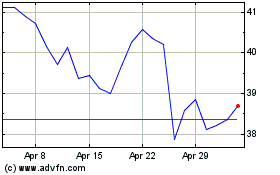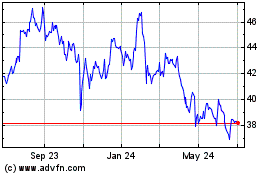Universal Makes Movies Now Playing in Theaters Available for Digital Rental -- 2nd Update
March 16 2020 - 7:46PM
Dow Jones News
By R.T. Watson
Comcast Corp.'s Universal Pictures said it is making its movies
available to watch at home while they are still in theaters, a
massive change from Hollywood's long-established business model
that could upend the industry if other studios follow suit.
The decision comes amid widespread closures of movie theaters as
the global coronavirus pandemic spreads. Authorities in New York
City and Los Angeles on Sunday ordered all movie theaters to close;
exhibitors had previously said they would limit attendance in
theaters to 50% of their capacity. China, the world's
second-largest market, has kept tens of thousands of theaters
closed since late January.
One of the nation's largest theater chains, Cineworld Group
PLC's Regal Entertainment Group, said Monday that it is temporarily
closing all of its 542 U.S. locations.
Major studios typically release new movies exclusively in
theaters during a window of 75 days in a bid to maintain ticket
sales, on the theory that fans are more likely to watch a new movie
at home if that is an option.
Keeping that strategy in place has long been a priority for
theaters, and major studios generally have been reluctant to do
away with such windows altogether, even as the lengths of those
periods have steadily shortened over the years.
Universal said that by Friday, recently released films like "The
Invisible Man," "The Hunt" and "Emma" will be available for digital
rental for $19.99 in the U.S., or the equivalent value in overseas
markets. Paying the rental fee will allow customers 48 hours to
watch the movie.
In an even bolder move, Universal also said "Trolls World Tour"
will open simultaneously in theaters and at home on April 10.
Universal released "The Hunt" in theaters over the weekend while
"The Invisible Man" and "Emma" both came out late last month.
Costing just $7 million to make, "The Invisible Man" has already
had a successful run in theaters, grossing $122.4 million globally
in three weekends.
"Rather than delaying these films or releasing them into a
challenged distribution landscape, we wanted to provide an option
for people to view these titles in the home," said NBCUniversal
Chief Executive Jeff Shell, who has long said he thinks theatrical
windows would continue to shrink under pressure from consumers.
"We hope and believe that people will still go to the movies in
theaters where available, but we understand that for people in
different areas of the world, that is increasingly becoming less
possible," he said.
Comcast's cable-television system also offers movies for rent
through on-demand video. The company is also launching its own
streaming service, called Peacock, in April. Universal didn't say
when these movies would move from on-demand to the new service.
Universal isn't the only studio rattling the market with
precipitous moves. On Friday, Walt Disney Co. said it was adding
"Frozen 2" to its Disney+ streaming platform three months ahead of
schedule, a move that could create a drag on DVD and online sales
and rentals.
Hollywood has discussed for years the possibility of shortening
the window, which prevented studios from releasing movies on DVD or
online until a certain period had passed. Theaters have resisted
such a move, though, seeing windows as key to their business model.
A reduced window might cause more people to simply wait until
titles are made available online rather than going to the
theater.
At least as far back as 2018, executives at Universal and
AT&T Inc.'s Warner Bros. film studio were considering making
movies available to on-demand digital entertainment platforms 17
days after they premiered in theaters, The Wall Street Journal
previously reported.
Prospective prices ranged from $30 to $50. The studios even
offered to share the video-on-demand revenue with theaters.
For Universal, coordinating Monday's move could have been
legally tricky, risking an antitrust-law violation.
Long before people were facing extended periods at home under
self-quarantine in an effort to combat the spread of the new
coronavirus, Hollywood studios have suffered financially, as large
franchise films -- like Disney's Marvel and Star Wars titles --
tend to be the most reliable box-office performers.
As a result, streaming-subscription platforms like those offered
by Netflix Inc. and Amazon.com Inc. have started to produce
smaller-budget films, like adult dramas and comedies, which are
less likely to draw massive crowds to theaters.
While in recent years theatrical ticket sales in the U.S. and
Canada have posted some record years, much of the growth has been
created by rising ticket prices as attendance plateaus. Disney has
also attained an unprecedented level of dominance, capturing about
a third of the market on the back of its Marvel, Star Wars and
Pixar movies.
Meanwhile, robust growth in international streaming revenues
powered global entertainment spending beyond $100 billion for the
first time in 2019, according to data released by the Motion
Picture Association.
(END) Dow Jones Newswires
March 16, 2020 19:31 ET (23:31 GMT)
Copyright (c) 2020 Dow Jones & Company, Inc.
Comcast (NASDAQ:CMCSA)
Historical Stock Chart
From Mar 2024 to Apr 2024

Comcast (NASDAQ:CMCSA)
Historical Stock Chart
From Apr 2023 to Apr 2024
